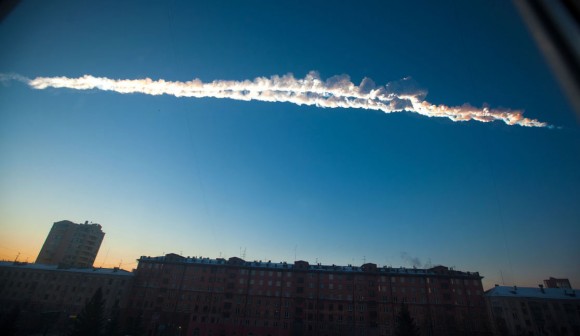

| Visitors Now: | |
| Total Visits: | |
| Total Stories: |

| Story Views | |
| Now: | |
| Last Hour: | |
| Last 24 Hours: | |
| Total: | |
Russian Meteor Experienced Melting Before Slamming Into Earth: Study

The two main smoke trails left by the Russian meteorite as it passed over the city of Chelyabinsk. Credit: AP Photo/Chelyabinsk.ru
A collision or “near miss” caused melting in the Chelyabinsk meteor before it slammed into Earth’s atmosphere this February, causing damage and injuries to hundreds in the remote Russian region.
A new study, presented at the Goldschmidt Conference in Florence, Italy, says some meteorite fragments’ composition shows strong evidence of heating, which is an indication of interplanetary violence of some sort.
“The meteorite which landed near Chelyabinsk is a type known as an LL5 chondrite, and it’s fairly common for these to have undergone a melting process before they fall to Earth,” stated Victor Sharygin, a researcher from the Sobolev Institute of Geology and Mineralogy in Russia.
“This almost certainly means that there was a collision between the Chelyabinsk meteorite and another body in the solar system, or a near miss with the Sun.”
(…)
Read the rest of Russian Meteor Experienced Melting Before Slamming Into Earth: Study (417 words)
© Elizabeth Howell for Universe Today, 2013. |
Permalink |
No comment |
Post tags: Chelyabinsk, russian meteor
Feed enhanced by Better Feed from Ozh
Source: http://www.universetoday.com/104391/russian-meteor-experienced-melting-before-slamming-into-earth-study/


